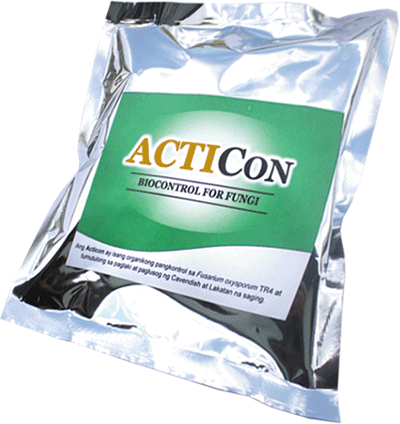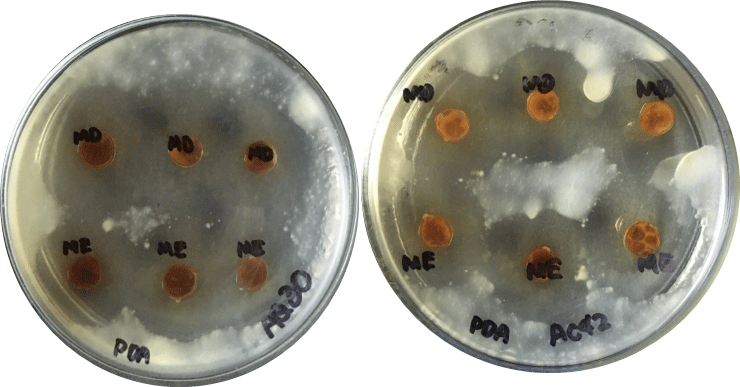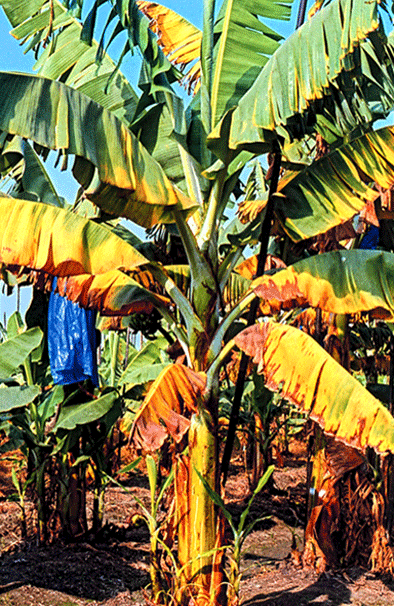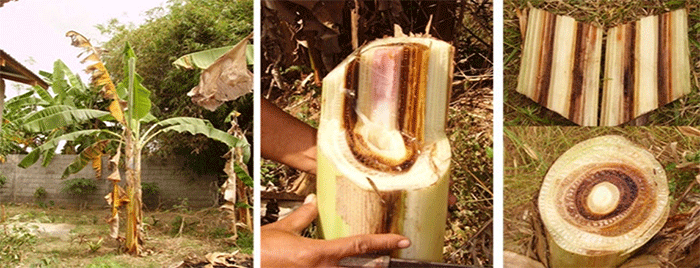
Results of a recently completed project on “Pilot-testing of ACTICon™ as Biocontrol Agent Against Fusarium Wilt (FocTR4) in Cavendish Banana,” proved the effectiveness of the biocontrol agent in lowering FocTR4 infection, otherwise known as Panama disease.
This was reported by project leader Irene A. Papa during the virtual project terminal review organized by the Philippine Council for Agriculture, Aquatic and Natural Resources Research and Development of the Department of Science and Technology (DOST-PCAARRD).
According to Papa, Fusarium oxysporum f. sp. cubense is a fungus that lives in the soil and attacks the plants from the roots. It survives in the soil for decades, making the land unusable for non-resistant crops. The disease can cause 100% mortality rate, hence 100% yield loss for non-resistant varieties and 10%-25% mortality for resistant varieties. Viable eradication is currently not possible. With the development of ACTICon™, the disease can be prevented. It can be an important part in the integrated pest management strategy of banana growers in Mindanao. Moreover, it could help improve yield and income of banana growers.

Through DOST’s funding support, Papa developed the new biocontrol formulation branded as ACTICon™, together with her team at the University of the Philippines Los Baños- National Institute of Molecular Biology and Biotechnology (UPLB-BIOTECH). The product was further pilot-tested in Davao del Norte under the funding assistance of DOST-PCAARRD.
Papa reported that ACTICon™ enhanced plant growth as shown by profused rooting and growth of the meriplants in the nursery. ACTICon-treated meriplants increased survival rate by 97.49% compared with 72.1% survival rate of untreated meriplants.
ACTICon™ lowered infection brought about by FocTR4. Cavendish bananas (Grand Nain variety) planted in abandoned and heavily FocTR4-infected farm in Asuncion Davao del Norte, had high survival rate at 94.91%. Fruiting was higher in ACTICon™-treated Cavendish bananas 15 months after transplanting at 30.32 tons per hectare (t/ha) harvest compared with only 14.17 t/ha in untreated plants.

Moreover, Papa said that in Sto. Tomas, Davao del Norte, the effects of ACTICon was enhanced with the addition of complete fertilizer. Plant height and girth improved and infection rate was low at only 16.66%. A total yield of 351.54 kg at 15 months after transplanting, was harvested.
The research team of Papa arrived at a positive cost and return analysis of the product development and application. A projected net income of P1.8 M can be attained if projected sales of ACTICon™ per year of P9.4 M is realized. This is assuming that target market of ACTICon™ is 30% (25,742.7 ha) of total hectares planted with Cavendish banana in the Philippines.
The project was also featured during the recently concluded DOST-PCAARRD virtual celebration of the National Biotechnology Week. During the open forum, Papa said that ACTICon can also be effective for preventing the same disease in Lacatan banana variety and for Abaca, though studies using these crops have not yet been done. She also said that the product can be used in heavily infested fields but its frequency of application should be increased, starting from meriplants, at transplanting, and 30 days after transplanting.


Furthermore, Papa said that safety of the microbes was studied as it is a requirement before doing the field trials. Hence, ACTICon™ is safe to handle and use by farmers. Its shelf-life is 6-7 months. When asked on her confidence about the product, Papa confidently said the ACTICon is effective considering the positive results from two preliminary field trials and two pilot testing that her team conducted in Davao del Norte. The product is ready for registration and the project team is open to collaboration for product promotion and commercialization (Ofelia F. Domingo, DOST-PCAARRD S&T Media Services)
















